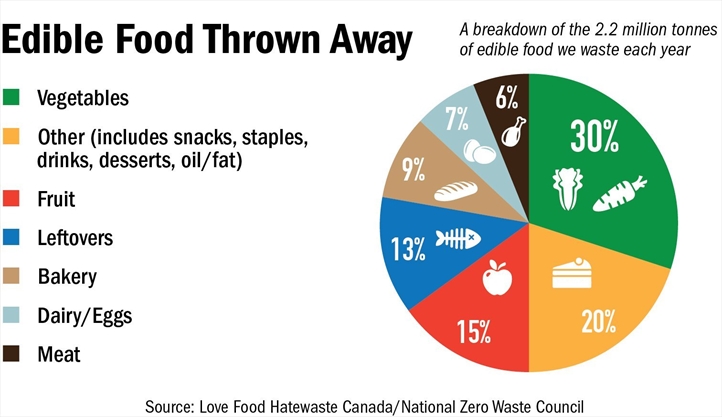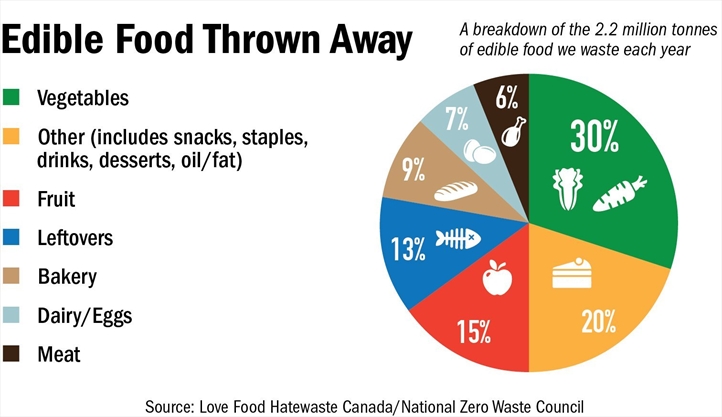To reduce food waste, Sharma says store managers will either use the meat for food sold at the ready-to-eat section, sell items like milk to the Mississauga Food Bank at a lower cost and donate other items at no cost.
The Mississauga Food Bank reported an 18 per cent increase in use of neighbourhood food banks, meal programs, and other sources of emergency food and nearly one in every 10 households in Peel struggles with food insecurity, according to the Peel Region’s strategic plan.
Organizations like the Muslim Welfare Centre in Mississauga see many of those families everyday. It provides food donations to up to 800 families every month, with an average of four or five people in each family, according to manager of the centre, Dastagir Bhura.
In cases where food can’t be donated — due to factors out of the stores control, such as clerical errors that result in a supplier delivering too much food or a dip in shopper consumption — Sharma concedes food ends up in the waste stream.
“From a store perspective, some of our stores aren’t very big so there isn’t enough to send to a local food drive or organization that might need the food,” Sharma says.
This isn’t uncommon for small to mid-size businesses according to Malaz Sebai, project manager of Partners in Project Green, a program run by the Toronto and Region Conservation Authority (TRCA) that helps local businesses achieve sustainability results.
Insufficient volume of food waste, along with costs associated with recycling deters many of these businesses from successfully diverting food waste, he says.
While larger food and beverage manufacturers, like Maple Leaf Foods Inc. produce the highest volume of food waste, diversion rates are much lower at the small and mid-size businesses in Peel Region, Sebai says, based on a TRCA commissioned study that looked at food waste generated primarily by manufacturers.
When exact numbers from this study were requested by the Mississauga News/the Brampton Guardian to verify that claim, Sebai said it was a private study and data could not be shared.
Currently, it is not mandatory for the IC&I sector to report how much overall waste is generated, Sebai notes.
However, it is estimated that the IC&I sector is responsible for nearly 60 per cent of the 25 million tonnes of waste generated annually in Canada and diverts only 19 per cent of it, according to Jo-Anne St. Godard, executive director at the Recycling Council of Ontario (a nonprofit organization involved in policy, education and project work around the issues of consumption, waste generation, reduction and diversion, and recycling). Comparatively, the residential sector has a diversion rate of more than 65 per cent largely driven from municipal programs.

President and CEO of the Ontario Restaurant Hotel and Motel Association, Tony Elenis, says food waste in landfills is an issue, but municipalities need to implement better pickup services or incentives for the industry to recycle food waste.
Currently, municipalities don’t service food waste in the IC&I sector, St. Godard explains. But the Recycling Council of Ontario’s pilot project in the Region of Durham is hoping to change that by mimicking how municipalities collect food waste in residential areas at the business sector level.
“(Food waste) is collected by private haulers contracted out building by building — you could have seven different haulers going down the same street at different times of the day, different days of the week, picking up little bit by little bit,” she says.
Business improvement areas, she explains, will create a “buying group” of businesses in the area and co-ordinate a co-operative model to collectively purchase waste solution services to collect the group’s waste together.
Based on preliminary results of the pilot project, St. Godard says many businesses don’t understand how much they pay for disposal, regardless if food waste is separated or not.
There is still a cost to managing garbage in a bag, the cost doesn’t go away, she says.
“What we are trying in the Durham Region is talk to your neighbour and they talk to their neighbours and so on — we’re looking at a regional collective system where you collect the materials on a regional basis and regardless of how much you are actually generating, you all share a service.”
In the next instalment of this ongoing series we will take a look at the food waste each of us is producing, how much it is costing us and what we can do to address the problem.

